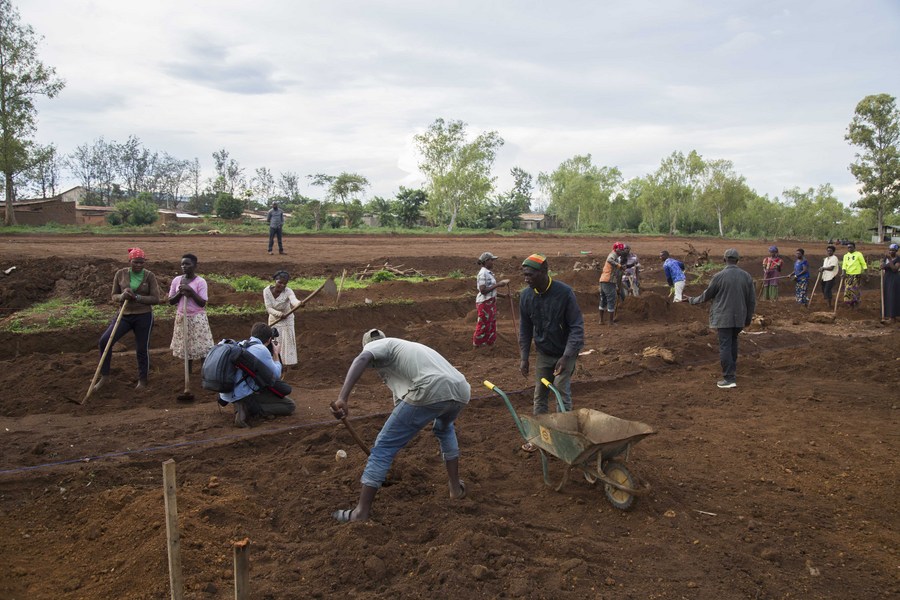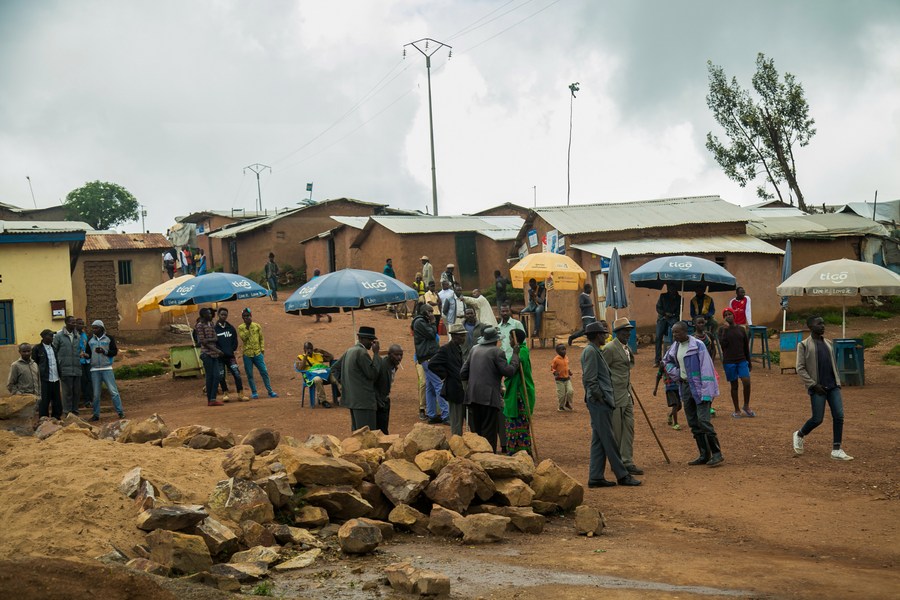
The file photo shows people constructing sports fields for refugees evacuated from Libya in the Gashora transit center, eastern Rwanda, on Oct. 23, 2019. (photo by Cyril Ndegeya/Xinhua)
Through financial assistance and permission to work, refugees in Rwanda are defying the odds and turning their lives around.
KIGALI, June 12 (Xinhua) — Esperance Musanganire, a native of the Democratic Republic of the Congo (DRC), fled her war-torn homeland and arrived in Rwanda in 2012, in search of safety and a better future.
Despite numerous challenges facing refugees like her, Musanganire is determined to rebuild her life and contribute positively to her new community in Kigeme refugee camp, in Nyamagabe, a district in Rwanda’s Southern Province.
Using savings from working at construction sites, she started with an initial capital of 20,000 Rwandan francs (about 17.6 U.S. dollars), selling sacks of Irish potatoes outside the refugee camp.
Her endeavors received a boost from “Jya Mbere,” a Rwandan government project aiming to empower refugees by offering them the opportunity to start their own businesses.
Through financial assistance and permission to work, refugees like Musanganire are defying the odds and turning their lives around.
With the support of “Jya Mbere,” she was able to secure a loan of 4.8 million Rwandan francs from Inkomoko, an advisory firm and impact investor, after completing an entrepreneurship course.
She used the money to invest in plots of land outside the refugee camp.
“I am now the proud owner of a house constructed outside the refugee camp in Kamonyi district, Southern Province,” Musanganire told Xinhua in a recent interview.
The house she spent 14 million Rwandan francs to build is now rented out.
Musanganire also owns a plot worth 7 million Rwandan francs in Gasabo, a district in Kigali, the Rwandan capital.
“‘Jya Mbere’ played a significant role in assisting me by partially refunding the loan obtained from Inkomoko. This means a great deal to me. Despite (us) being refugees, this country has been kind to us, offering us hope and equal opportunities,” she said.
Musanganire now hires nine individuals, some at her hair salon, others at a restaurant. Four of them are fellow refugees.
Alain Gustave Ngwije, a Burundian refugee in Mahama, Kirehe district, Eastern Province, expressed his gratitude for the support he received.

The file photo shows locals at the Gihembe Refugee Camp in Gicumbi district, northern Rwanda, April 8, 2018. (Xinhua)
The “Jya Mbere” project helped him take care of his family, he said, adding that he has been fortunate to have secured a job as a refugee.
“Living in a refugee camp is challenging, with hardships and inefficient services. Without a job, life becomes even more difficult for refugees, presenting additional challenges. However, through my role as an agronomist with Sabana farmers’ cooperative, I help farmers enhance productivity by imparting knowledge on improved farming practices, such as the use of fertilizers,” Ngwije said.
Jeannette Uwimana, acting project manager of “Jya Mbere,” spoke of the generosity of Rwanda in hosting refugees and emphasized the shared basic services, such as water supply, education, healthcare access, markets, and roads that promote cohabitation and shared environments.
“‘Jya Mbere’ was created to alleviate the pressure that the presence of refugees puts on host communities. It provides access to finance for refugees and host communities through matching grants,” she said.
“Capacity-building is a crucial part of the project, enhancing the entrepreneurial skills of refugees and host communities living together,” Uwimana said.
Through the project, she said, the Rwandan government allows refugees to engage in business activities, leading to a significant number of successful refugee-run businesses in the country.
Musanganire’s is one of the many success stories where refugees enjoy access to matching grants and set up businesses that also employ members of the host community.
“Jya Mbere,” run by the Ministry in Charge of Emergency Management (MINEMA), is being implemented in six districts hosting refugee camps, namely Gatsibo, Gicumbi, Gisagara, Karongi, Nyamagabe, and Kirehe.
According to MINEMA data, as of May 31, 2022, Rwanda hosts a total of 127,369 refugees from neighboring countries such as the DRC and Burundi. There are also refugees from Afghanistan and migrants evacuated from Libya living in Rwanda. ■
